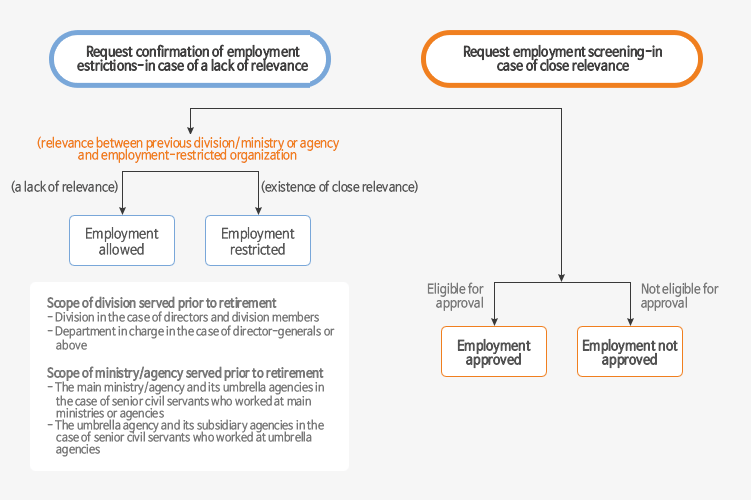Employment Restrictions for Retired Civil Servants
Employment Restrictions for Retired Civil Servants
Util Menu
Employment restrictions for retired civil servants
Purpose of employment restrictions
To ensure fairness and establish ethical standards in the civil service by preventing retired civil servants from having illegal relationships with other organizations or from exerting undue influence on their previous ministries or agencies
Outline
- Subjects and period of restriction: retired civil servants subject to employment screening are restricted from certain forms of employment for 3 years after retirement
- Conditions for restriction: a civil servant’s division (or ministry/agency in the case of senior civil servants) served for 5 years prior to retirement has close relevance to an institution the person is seeking employment with * Scope of relevance: close relevance is assumed to exist for duties involving financial assistance, permission and approval, inspection and audit, assessment and imposition of tax, contracts, supervision, investigation, etc.
- Employment-restricted institutions
- ① For-profit private companies with capital exceeding KRW 1 billion and annual turnover exceeding KRW 10 billion
- ② Law firms, accounting firms, foreign legal consulting firms, joint venture law offices with annual turnover exceeding KRW 10 billion
- ③ Tax accounting firms with annual turnover exceeding KRW 5 billion
- ④ Associations where employment-restricted private companies are members
- ⑤ Market-based public corporations referred to in Article 5, Paragraph 3, Subparagraph 1 (a) of the Act on the Management of Public Institutions
- ⑥ Public service organizations engaging in supervision of safety, regulation of permission and approval, or procurement duties
- ⑦ Educational foundations that establish and operate schools under Article 2 of the Elementary and Secondary Education Act and the Higher Education Act and private schools established and operated by such educational foundations
- ⑧ General hospitals referred to in Article 3-3 of the Medical Service Act and corporations that establish such hospitals
- ⑨ Social welfare foundations with fundamental assets exceeding KRW 10 billion as referred to in Article 2, Paragraph 3 of the Social Welfare Services Act and not-for-profit corporations other than social welfare foundations that operate social welfare facilities
- ⑩ Private companies, corporations and associations in certain industries including defense, food, pharmaceuticals, etc.
Employment screening process
- ① Is the person subject to employment screening?* (If retired before June 3, 2020) civil servants subject to property registration and executive officers and employees of public service organizations
(If retired on or after June 4, 2020) civil servants who meet the criteria in Article 3, Paragraph 1, Subparagraph 1 to 12 of the Civil Service Ethics Act and Article 31, Paragraph 1 of the Enforcement Decree of the Civil Service Ethics Act - ② Is the person seeking employment at an employment-restricted institution?
- ③ Does the person’s work performed at the division (or ministry or agency in the case of senior civil servants) where he or she served for 5 years prior to retirement have close relevance to the employment-restricted institution?
